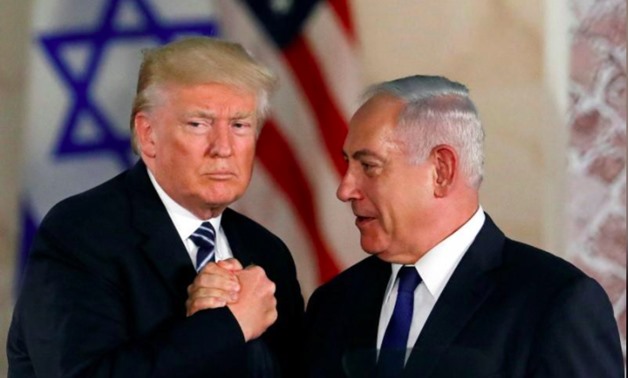
U.S. President Donald Trump and Israeli Prime Minister Benjamin Netanyahu shake hands after Trump's address at the Israel Museum in Jerusalem May 23, 2017. REUTERS/Ronen Zvulun
CAIRO – 9 December 2017: Following U.S. President Donald Trump’s declaration concerning Jerusalem, The New York Times contacted and interviewed all 11 U.S. ambassadors to Israel to ask for their commentaries over the matter.
“All but two of 11 former United States ambassadors to Israel contacted by The New York Times after President Trump’s decision to recognize Jerusalem as Israel’s capital thought the plan was wrongheaded, dangerous or deeply flawed,” The New York Times reported on Wednesday.
The two former ambassadors who conceded that Trump’s decision was the “right thing to do” did so under the pretense that “we’ve been remiss in not recognizing realities as they are,” as Edward S. Walker, Jr., who was the ambassador to Israel from 1997 to 1999, stated.
The majority of the ambassadors interviewed however, do not share this view.
Daniel C. Krutzer, who was ambassador during the Bush administration from 2001 to 2005, does not think that there are any upsides to the matter.
“There are many downsides, both diplomatically and in terms of the Middle East peace process, and no upside,” Kurtzer said to The New York Times. “We are isolated internationally once again — except for the Israeli government, which supports this — and we are taking ourselves out of the role the president says he wants to play as a peace broker.”
Furthermore, former Ambassador Richard H. Jones (2005-2009) suspected that the matter would actually spark bigger tensions in the Middle East. The former ambassador believes that the Islamic State and Hamas may “exploit the issue to incite violence,” The New York Times reported.
“Several of the ambassadors were open to recognizing West Jerusalem as Israel’s capital. But they said that should happen as part of a broader strategy that would also require the Israelis to halt or slow settlement construction and that would recognize East Jerusalem as the capital of a future Palestinian state,” The New York Times article stated.
Sharing a similar view, former Ambassador William Caldwell Harrop (1992-1993) felt that Trump’s declaration was “slightly reckless” and in a sense, “masochistic”. Several ambassadors agreed that the declaration was in a way intended to provoke, since Trump could have phrased the declaration in a much more diplomatic manner.
Theorizing over the U.S.’ interests in making such a decision
The disappointment and head-shaking were not limited to the former U.S. ambassadors alone. Many around the world still exhibit feelings of shock following Trump’s declaration. It seems nonsensical at the surface, but it most definitely carries an agenda, and one that many have speculated over.
One of the most sought out theories is the most obvious one: Trump is causing rife in the region; he is raising the heat on the conflict already stewing in the Middle East.
Taha Khatib, a political analyst, stated to Egypt Today that the decision to declare Jerusalem as the capital of Israel aims to strike at regional interests. “The aim is to divide the Arab region, not simply Palestine… What Trump has done no other U.S. president dared do; what he has done is steal what is rightfully theirs [Palestinians’],” Khatib commented.
“Let me be honest, this decision is angering the entire region and prompting Palestinians to hold a third intifada. But this intifada can’t be held by the Palestinians alone, all Arabs need to be involved in this intifada,” Khatib explained.
Similarly, Oday Anwar, a Palestinian political analyst, agreed with Khatib and the nine former U.S. ambassadors.
“Trump has ended the peace process to serve American interests, and he did so to avert attention from the issues currently plaguing the U.S. This man wanted to ignite the region with an uncalculated decision to fulfill a promise he made to Israel,” Anwar remarked.
Several other political analysts agreed with the theory. Even the U.S. ambassadors themselves are not convinced that Trump is truly “committed to spreading peace in the region” as he stated. Its several factors that cause one’s intuition to view such a phrase with more than mere skepticism.
It’s the phrasing of the speech, it’s the manner with which U.S. representatives defend Israel during every UN Security Council that pertains to them. It’s just that the matter seems more vindictive and power-boasting than it seems diplomatic. And to make matters worse, vindictive and power-boasting is the only kind of language Donald Trump speaks.


Comments
Leave a Comment